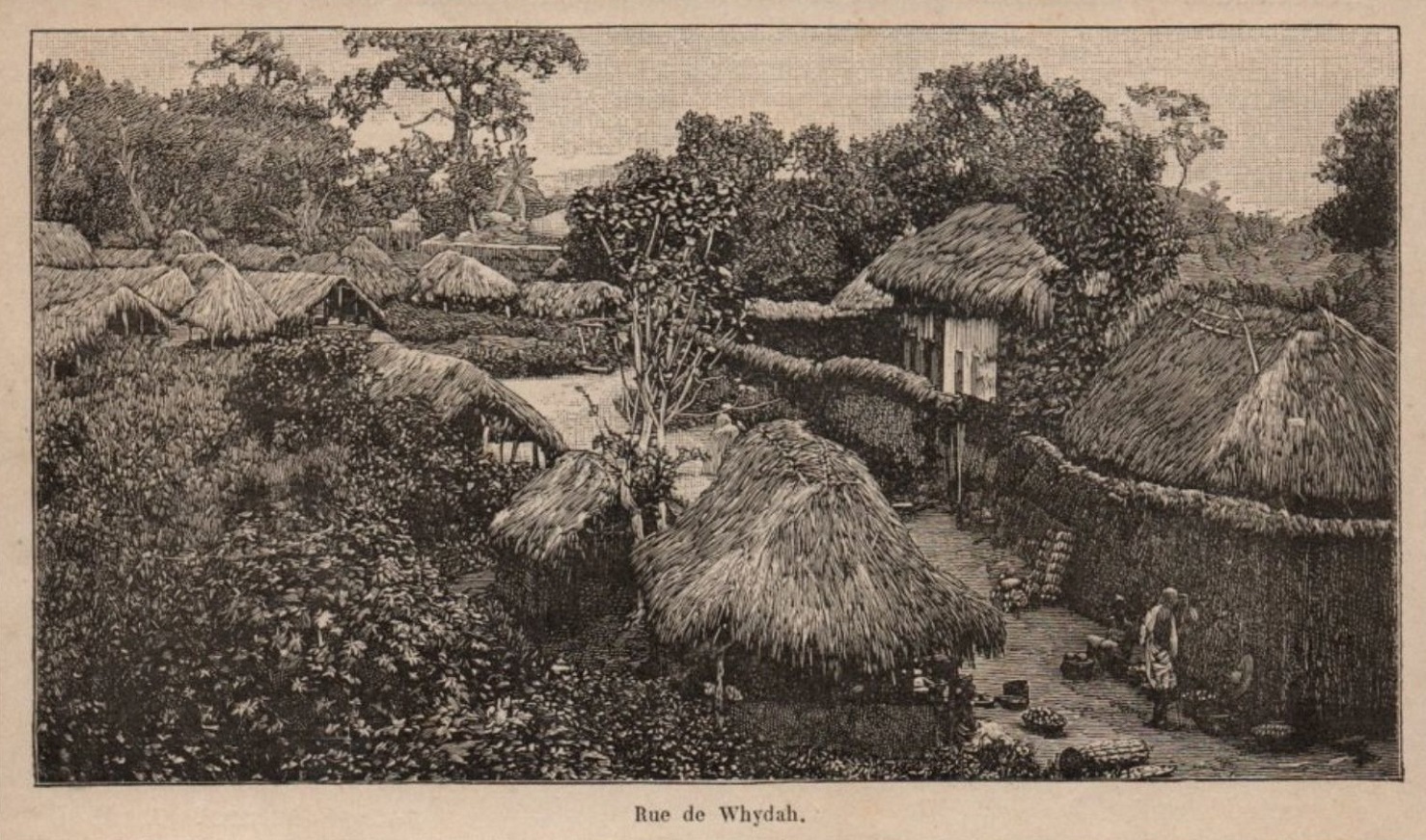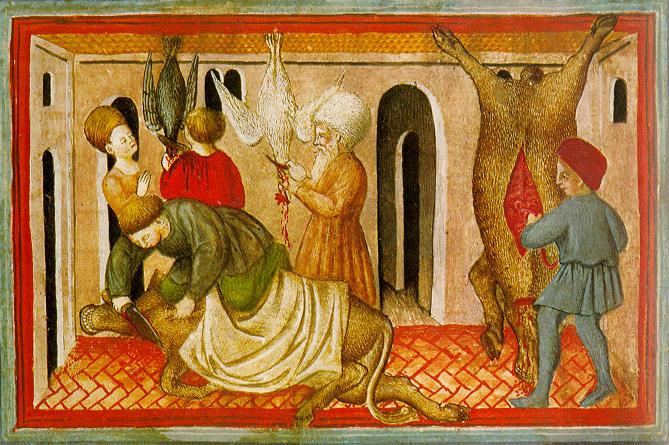|
Fête Du Vodoun
Traditional Day or Fête du Vodoun (literally Vodoun Festival, also known as Traditional Religions Day) is a public holiday in Benin that celebrates the nation's history surrounding the West African religion of Vodoun. The celebration is held annually on January 10 throughout the country but most notably in the city of Ouidah. Beginning with the slaughter of a goat in honor of the spirits, the festival is filled with singing, dancing and the imbibing of liquor, especially gin. Vodoun was officially declared a religion in Benin in 1996 and the festival has attracted thousands of devotees and tourists to Ouidah to participate in the festivities ever since. Pictures File:Zangbeto Benin festival Jan 2018.webm, Zangbeto performing in Fête du Vodoun in Grand-Popo Grand-Popo is a town, arrondissement, and commune in the Mono Department of south-western Benin. The commune covers an area of 289 square kilometres and as at the 2013 Census had a population of 57,636 people. The term ... [...More Info...] [...Related Items...] OR: [Wikipedia] [Google] [Baidu] |
Public Holiday
A public holiday, national holiday, or legal holiday is a holiday generally established by law and is usually a non-working day during the year. Sovereign nations and territories observe holidays based on events of significance to their history, such as the National Day. For example, Australians celebrate Australia Day. They vary by country and may vary by year. With Public holidays in Nepal, 36 days a year, Nepal is the country with the highest number of public holidays but it observes six working days a week. India ranks second with 21 national holidays, followed by Colombia and the Philippines at 18 each. Likewise, China and Hong Kong enjoy 17 public breaks a year. Some countries (e.g. Cambodia) with a longer, six-day workweek, have more holidays (28) to compensate. The public holidays are generally days of celebration, like the anniversary of a significant historical event, or can be a religious holiday, religious celebration like Diwali. Holidays can land on a specific day ... [...More Info...] [...Related Items...] OR: [Wikipedia] [Google] [Baidu] |
Benin
Benin ( , ; french: Bénin , ff, Benen), officially the Republic of Benin (french: République du Bénin), and formerly Dahomey, is a country in West Africa. It is bordered by Togo to the west, Nigeria to the east, Burkina Faso to the north-west, and Niger to the north-east. The majority of its population lives on the southern coastline of the Bight of Benin, part of the Gulf of Guinea in the northernmost tropical portion of the Atlantic Ocean. The capital is Porto-Novo, and the seat of government is in Cotonou, the most populous city and economic capital. Benin covers an area of and its population in was estimated to be approximately million. It is a tropical nation, dependent on agriculture, and is an exporter of palm oil and cotton. Some employment and income arise from subsistence farming. The official language of Benin is French, with indigenous languages such as Fon, Bariba, Yoruba and Dendi also spoken. The largest religious group in Benin is Sunni Islam (27 ... [...More Info...] [...Related Items...] OR: [Wikipedia] [Google] [Baidu] |
Vodoun
Vodun (meaning ''spirit'' in the Fon, Gun and Ewe languages, with a nasal high-tone ''u''; also spelled Vodon, Vodoun, Vodou, Vudu, Voudou, Voodoo, etc.) is a religion practiced by the Aja, Ewe, and Fon peoples of Benin, Togo, Ghana, and Nigeria. Elements of the West African religion survived slavery and evolved into the current forms of religions with similar names that are found in the New World among the African diaspora in the Americas, such as Haitian ''Vodou''; Louisiana ''Voodoo''; Cuban ''Vodú''; Dominican ''Vudú'', Venezuelan Yuyu, and Brazilian ''Vodum'' (Candomblé Jejé and Tambor de Mina). Theology and practice Vodun cosmology centers around the ''vodun'' spirits and other elements of divine essence that govern the Earth, a hierarchy that range in power from major deities governing the forces of nature and human society to the spirits of individual streams, trees, and rocks, as well as dozens of ethnic vodun, defenders of a certain clan, tribe, or na ... [...More Info...] [...Related Items...] OR: [Wikipedia] [Google] [Baidu] |
Ouidah
Ouidah () or Whydah (; ''Ouidah'', ''Juida'', and ''Juda'' by the French; ''Ajudá'' by the Portuguese; and ''Fida'' by the Dutch) and known locally as Glexwe, formerly the chief port of the Kingdom of Whydah, is a city on the coast of the Republic of Benin. The commune covers an area of and as of 2002 had a population of 76,555 people. History In local tradition Kpassa is supposed to have founded the town. This probably happened towards the end of the sixteenth century. The town was originally known as ''Glēxwé'', literally 'Farmhouse', and was part of the Kingdom of Whydah. Ouidah saw its role in international trade rise when the Royal African Company (RAC) constructed a fort there in 1650. Whydah troops pushed their way into the African interior, capturing millions of people through wars, and selling them to European and Arab slave traders. By 1716, the Kingdom of Whydah had become the second largest slave port in the triangular trade, as noted by the crew of the slave ... [...More Info...] [...Related Items...] OR: [Wikipedia] [Google] [Baidu] |
Ritual Slaughter
Ritual slaughter is the practice of slaughtering livestock for meat in the context of a ritual. Ritual slaughter involves a prescribed practice of slaughtering an animal for food production purposes. Ritual slaughter as a mandatory practice of slaughter for food production is practiced by Muslim and Jewish communities totaling nearly 25% of the world population. Both communities have similar religious philosophies in this regard. American scientist Temple Grandin has researched ritual slaughter practices and says that abattoirs which use recommended practices cause livestock little pain; she calls the UK debate over halal slaughterhouses misguided, and suggests that inhumane treatment of animals happens in poorly run slaughterhouses regardless of their halal status. The Farm Animal Welfare Committee (FAWC), which advises British government on how to avoid cruelty to livestock, on the other hand, says the way Jewish kosher and Muslim halal meat is produced causes severe suffering t ... [...More Info...] [...Related Items...] OR: [Wikipedia] [Google] [Baidu] |
Zangbeto
Zangbeto are the traditional voodoo guardians of the night among the Ogu (or Egun) people of Benin, Togo and Nigeria Nigeria ( ), , ig, Naìjíríyà, yo, Nàìjíríà, pcm, Naijá , ff, Naajeeriya, kcg, Naijeriya officially the Federal Republic of Nigeria, is a country in West Africa. It is situated between the Sahel to the north and the Gulf o .... A traditional police and security institution, the Zangbeto cult is charged with the maintenance of law and order, and ensures safety and security within Ogu communities. They are highly revered and act as an unofficial police force patrolling the streets, especially in the night, watching over people and their properties, and tracking down criminals and presenting them to the community to punish. Originally created to scare the enemy away, Zangbeto will wander the streets to detect thieves and witches, and to protect law and order. Description Relating its fundamental cultural role in local vigilantism and commu ... [...More Info...] [...Related Items...] OR: [Wikipedia] [Google] [Baidu] |
Grand-Popo
Grand-Popo is a town, arrondissement, and commune in the Mono Department of south-western Benin. The commune covers an area of 289 square kilometres and as at the 2013 Census had a population of 57,636 people. The term "Grand-Popo" is a European exonym for the ancient town and kingdom of "Hulagan" (Great Hula). The Hula/Xwla/Phla people that once dominated the Togo-Benin coast traditionally regarded Great Hula as their ancestral town of common origin. It is unclear why Europeans began calling it Popo rather than Hula. It may come from a generic Yoruba term "popo" for peoples to their "west", which was subsequently borrowed by the Portuguese to refer to the Hula/Phla specifically. An alternative theory connects the "Popo" term to an ancient ruler called Kpokpo of Tado (an Aja town in the interior), which the Europeans may have confused with Hulagan. The town grew around the slave trade, but coastal erosion has now destroyed most of the old town.Butler, Stuart (2019) ''Bra ... [...More Info...] [...Related Items...] OR: [Wikipedia] [Google] [Baidu] |
West African Vodun
Vodun (meaning ''spirit'' in the Fon, Gun and Ewe languages, with a nasal high-tone ''u''; also spelled Vodon, Vodoun, Vodou, Vudu, Voudou, Voodoo, etc.) is a religion practiced by the Aja, Ewe, and Fon peoples of Benin, Togo, Ghana, and Nigeria. Elements of the West African religion survived slavery and evolved into the current forms of religions with similar names that are found in the New World among the African diaspora in the Americas, such as Haitian ''Vodou''; Louisiana ''Voodoo''; Cuban ''Vodú''; Dominican ''Vudú'', Venezuelan Yuyu, and Brazilian ''Vodum'' (Candomblé Jejé and Tambor de Mina). Theology and practice Vodun cosmology centers around the ''vodun'' spirits and other elements of divine essence that govern the Earth, a hierarchy that range in power from major deities governing the forces of nature and human society to the spirits of individual streams, trees, and rocks, as well as dozens of ethnic vodun, defenders of a certain clan, tribe, or na ... [...More Info...] [...Related Items...] OR: [Wikipedia] [Google] [Baidu] |
Beninese Culture
Benin ( , ; french: Bénin , ff, Benen), officially the Republic of Benin (french: République du Bénin), and formerly Dahomey, is a country in West Africa. It is bordered by Togo to the west, Nigeria to the east, Burkina Faso to the north-west, and Niger to the north-east. The majority of its population lives on the southern coastline of the Bight of Benin, part of the Gulf of Guinea in the northernmost tropical portion of the Atlantic Ocean. The capital is Porto-Novo, and the seat of government is in Cotonou, the most populous city and economic capital. Benin covers an area of and its population in was estimated to be approximately million. It is a tropical nation, dependent on agriculture, and is an exporter of palm oil and cotton. Some employment and income arise from subsistence farming. The official language of Benin is French, with indigenous languages such as Fon, Bariba, Yoruba and Dendi also spoken. The largest religious group in Benin is Sunni Islam (27.7% ... [...More Info...] [...Related Items...] OR: [Wikipedia] [Google] [Baidu] |
January Observances
January is the first month of the year in the Julian and Gregorian calendars and is also the first of seven months to have a length of 31 days. The first day of the month is known as New Year's Day. It is, on average, the coldest month of the year within most of the Northern Hemisphere (where it is the second month of winter) and the warmest month of the year within most of the Southern Hemisphere (where it is the second month of summer). In the Southern hemisphere, January is the seasonal equivalent of July in the Northern hemisphere and vice versa. Ancient Roman observances during this month include Cervula and Juvenalia, celebrated January 1, as well as one of three Agonalia, celebrated January 9, and Carmentalia, celebrated January 11. These dates do not correspond to the modern Gregorian calendar. History January (in Latin, ''Ianuarius'') is named after Janus, the god of beginnings and transitions in Roman mythology. Traditionally, the original Roman calendar consi ... [...More Info...] [...Related Items...] OR: [Wikipedia] [Google] [Baidu] |




